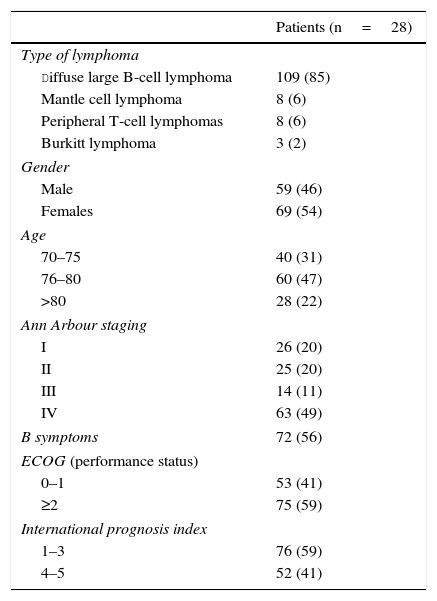The optimal treatment of aggressive non-Hodgkin lymphoma (NHL) in elderly patients remains controversial. We aimed to evaluate the impact of age and use of anthracyclines.
Patients and methodRetrospective analysis of patients with aggressive NHL aged over 70 years old.
ResultsOne hundred and twenty-eight patients with a median age of 76 years (70–91). Eighty-eight percent received chemotherapy, and 72% received anthracyclines. The overall response rate was 70%, 51% with a complete response (CR)/uncertain complete response and 19% with a partial response (PR). Overall survival (OS) was 28 months (95% confidence interval 18–78). In the diffuse large B-cell lymphoma group, progression-free survival (PFS) and OS were significantly better in patients who achieved CR versus PR. The use of anthracyclines was associated with CR, the international prognostic index (IPI) was associated with both survival and response, and age showed no association.
ConclusionsIn patients aged ≥70 years with aggressive lymphoma who received chemotherapy, the IPI but not age and the use of anthracyclines showed a prognostic impact. Therefore, in elderly patients with aggressive lymphomas, the use of anthracyclines should be considered and therapeutic decisions should not be based on age exclusively.
El tratamiento óptimo de los linfomas no hodgkinianos (LNH) agresivos en ancianos es controvertido. El objetivo de este estudio fue evaluar el impacto de la edad y de las antraciclinas en pacientes ancianos con LNH.
Pacientes y métodoAnálisis retrospectivo de pacientes con una edad>70 años, con LNH agresivo.
ResultadosSe incluyeron 128 pacientes, con una mediana de edad de 76 años (extremos 70-91). El 88% se trató con quimioterapia, y un 72% recibió antraciclinas. La tasa global de respuesta fue del 70%, con un 51% de respuestas completas (RC)/respuestas completas inciertas y un 19% de respuestas parciales (RP). La supervivencia global (SG) mediana fue de 28 meses (intervalo de confianza del 95% 18-78). En los pacientes con linfoma difuso de células grandes B, la supervivencia libre de progresión y la SG mediana fueron significativamente mejores en los que alcanzaron RC en comparación con los que alcanzaron RP. Las antraciclinas se asociaron a RC, el índice pronóstico internacional (IPI) se asoció tanto a supervivencia como a respuesta, y la edad no mostró ninguna asociación.
ConclusionesEn los pacientes con edad≥70 años con linfomas agresivos de nuestro centro que recibieron quimioterapia, tanto el IPI como el uso de antraciclinas mostraron impacto pronóstico, pero no la edad. Por tanto, creemos que el tratamiento de los pacientes ancianos con linfomas agresivos debería contemplar el uso de antraciclinas, y que la decisión terapéutica no debe basarse exclusivamente en la edad.








